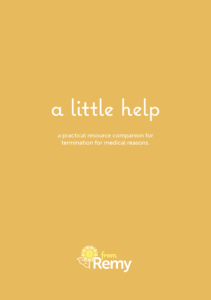If you have a toddler or older child who knew you were pregnant, you may be worried about what to tell them before and after a termination for medical reasons. The general rule is that children will be aware something is happening even if you don’t tell them. They may sense their parents are sadder, distracted or more distressed than usual. If they don’t receive any information, they might worry about what is wrong. The best way to reassure children is to explain that something is happening and to give them honest, concrete, age-appropriate information.
This may sound something like, “the baby wasn’t growing properly and they died” or “the baby’s heart stopped working and they died”. If possible, avoid euphemisms with young children, such as “They have gone to the sky”, “they passed away” or “they are with the angels”. These can be confusing for young children, whose brains understand things literally and aren’t capable of abstract thinking until they are older. You may want to include religious or spiritual beliefs, however try and separate these from the physical reality of what happened to the body. This can sound something like: “their body stopped working and they died but their soul/love/spirit continues in our hearts/in heaven”.
Please be aware these are just examples and they are guided by research on working with young children and grief. It is still a personal choice for you and might be guided strongly by cultural or religious beliefs.
It is also OK to let other children in the family see you being sad and crying, as it helps them to build a healthy understanding of how people grieve after death. If you add an explanation like: “I am crying because I am sad about [….]. It is normal to feel sad when this happens and it is not anything you have done to make me sad” then they will be reassured and less likely to be worried about your show of emotions.
You may fear that exposing your child to grief and death so early will damage them in some way. This is an understandable fear in a modern society that is not grief literate and provides the message that we should “get on with things”. However, research shows the opposite is probably true for most children – if their parents demonstrate healthy models of grieving, talking about loved ones who have died and showing natural sadness, then they will be less scared of people dying and will be able to talk more openly about their own experiences later on.
If possible, try to allow space for a bereaved sibling throughout their childhood to talk and ask questions about the baby who died. Their understanding will grow and change as they move through developmental stages and they may ask for more or different information. They might also want to lead the way with a ritual to remember their sibling, for instance lighting a candle, doing a drawing or having cake. Young kids learn from making some decisions (age-appropriately) so it is OK to ask them what they would like to do.
It can be hard for bereaved parents after a termination for medical reasons to have questions and unfiltered thoughts sprung on them by a young person in the house. There may be times where you don’t feel up to talking about it and this is OK. You can signal this to your child with: “I really want to hear your questions and answer them but my brain just can’t fit that in right now. Let’s make time to talk about it later when I feel up to it.”
Here is a series of books produced especially for siblings and their families after termination for medical reasons:
https://pregnancyafterlosssupport.org/childrens-book-series-termination-for-medical-reasons-review/





